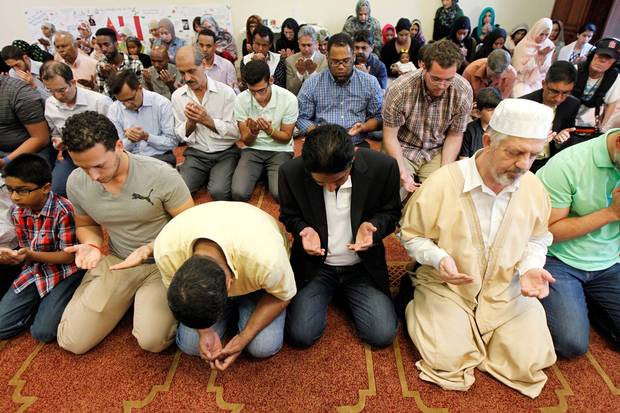Monday marks the start of Ramadan, a holy month of fasting and prayer – but in Louisville, Ky., it's also a period of mourning for native son Muhammad Ali, who died last week.
On Friday, politicians, celebrities and fans are gathering for a memorial service that the celebrated fighter, a convert to Islam, planned himself. Here's a broader look at how memorials for Ali are crossing national borders and boundaries of faith
IN PICTURES
Ramadan around the world
IN LOUISVILLE
'There is no greater man that has done more for this city'
by Bruce Schreiner And Claire Galofaro (Associated Press) in Louisville, Ky.
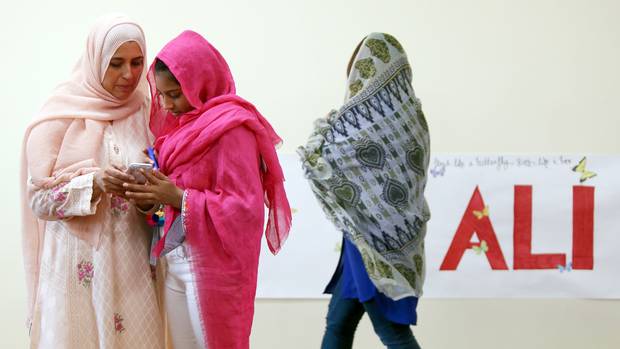
Two women look at photos they made of worshippers who wrote messages on a banner during an interfaith memorial service for Muhammad Ali at the River Road Mosque in Louisville, Ky., on June 5.
MARK LYONS/GETTY IMAGES
Muhammad Ali's younger brother wept, swayed to hymns and hugged anyone he could reach. He raised his hands to the sky, eyes closed, surrounded by congregants at the church where their father once worshipped.
Rahaman Ali took centre stage at the two-hour service at King Solomon Missionary Baptist Church, sitting in a front-row pew with his wife, Caroline. The church is not far from the little pink house in Louisville's west end where the Ali brothers grew up.

Rahaman Ali, brother of Muhammad Ali, right, cries while embraced by assistant pastor Rev. Charles Elliott, III. during a service at King Solomon Missionary Baptist Church on June 5.
DAVID GOLDMAN/ASSOCIATED PRESS
It was one of several emotional remembrances Sunday as the city joined together to mourn its most celebrated son, the Louisville Lip. An airplane carrying the boxing great's body landed in his grieving hometown Sunday afternoon.
At services all over town, they recited Ali's words on religion: "Rivers, lakes, ponds, streams, oceans all have different names, but they all contain water," Ali once said. "So do religions have different names, and they all contain truth."
At a Sunday evening memorial at the Louisville Islamic Center, speakers from many faiths – Muslims, Christians, Catholics, Jews – lamented that Ali's death came at a time when political rhetoric is getting more divisive.
They did not mention Republican presidential candidate Donald Trump by name, but the reasons for the theme were clear. The Republican presidential candidate said he would temporarily ban all Muslims from entering the United States, a proposition Ali used one of his last public statements to rebuke.
"When the clamour of the disaffected targets those considered other we need someone to cry out that people are not born other – we make them other, through our fear, through our prejudice, our hatred, our desire to grasp for more than is rightfully ours," said Rev. Derek Penwell, who leads a Christian church in Louisville. "We need a voice who knows that true power is to help us to see that our determination to love in spite of our fear is the greatest expression of power that human beings can muster."
Ali famously converted to the Islamic faith and refused to fight in the Vietnam War, though it cost him years of his boxing career. He insisted throughout his life that people of all faiths and colours should come together in peace, and the speakers at the Islamic Center pondered whether anyone else has the strength or statute to take on the fight. "Now who will push back the agents of hatred and watch our back?" asked Dr. Muhammad Baber. "When we fight these demons of Islamophobia, who will show the light to our youth surrounded by traitors of terror? … Who will testify for our innocence in this season of witch hunting?"
Even after his conversion, Ali sometimes attended King Solomon Missionary Baptist Church. Ali's father, Cassius Clay Sr., a painter, was an active member of the congregation before his death decades ago. He painted a mural of Jesus' baptism that still hangs behind the pulpit.

Parishioner Gail Smith prays at King Solomon Missionary Baptist Church on June 5.
DAVID GOLDMAN/ASSOCIATED PRESS
"There is no greater man that has done more for this city than Muhammad Ali," the church's assistant pastor, Charles Elliott III, said Sunday morning, drawing a round of "amens" and prolonged applause from the congregation.
Elliott recalled the comical side of the former boxing champion and global humanitarian, who died Friday night at an Arizona hospital. Elliott said his grandmother was once a nanny to Ali's family. He visited as a wide-eyed young boy, he said, and recalled the house had an elevator and a parrot who called out: "Here comes the champ, here comes the champ."
His father, the Rev. Charles Elliott Jr., knew Ali for decades and remembered his generosity. He recalled when he was raising money in the 1960s to keep a program running to feed the city's hungry, and Ali cut him a cheque. At the time, the program offered food twice a week, he said. "He came in and he said, 'Reverend, let's feed 'em every day. I'll give you a cheque.' "
IN THE MUSLIM WORLD
Mourning Ali in Egypt: 'God created him to box, not for anything else'
by Hamza Hendawi (Associated Press) in Cairo
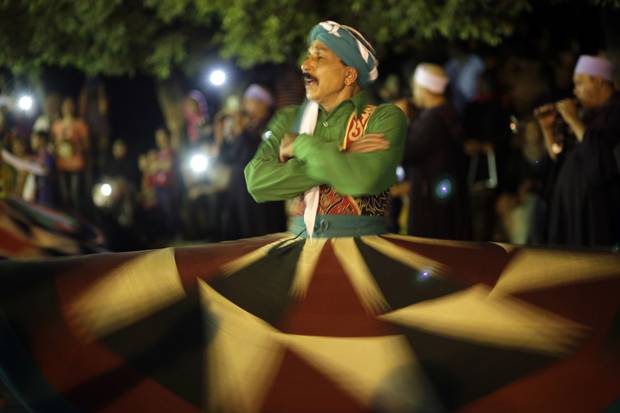
A whirling dervish spins during a performance to mark the holy month of Ramadan at El-Moez Street in historical Fatimid Cairo on June 5.
AMR NABIL/ASSOCIATED PRESS
Of all Muhammad Ali's travels, his 1964 trip to Egypt was perhaps the most symbolic, bringing him face to face with president Gamal Abdel Nasser, who had punched above his own weight as a champion of Third World struggles. Nasser was viewed with suspicion by the United States, but revered across much of Africa and Asia for confronting European colonial powers. For the newly crowned heavyweight champion, being received by one of America's chief enemies announced his arrival on the global stage as a powerful voice of change.
The boxing genius and revolutionary political views of Ali, who died Friday at age 74, emerged when America's civil-rights movement was in full swing and the Vietnam war raged on, sharply dividing Americans.
The Muslim world was also gripped by upheaval, stemming from the withdrawal of the colonial powers and the onset of the Cold War. Nasser, a popular Arab nationalist and Soviet ally, had emerged as a leading opponent of American "imperialism," and his fiery speeches touched on themes that would later be embraced by Ali.
Ali's conversion to Islam won him the support of many across the region. Three years later, his refusal to serve in the U.S. Army in Vietnam – "I ain't got no quarrel with them Viet Cong" – and his subsequent loss of the world title resonated with Muslims, many of whom saw that conflict as the epitome of America's global tyranny.
"Muslims wanted a hero to represent them, and Clay was the only Muslim champion … No other Muslim athlete managed to achieve what Clay did … Thus, he was a symbol for Muslims," said Mohammed Omari, an Islamic law professor in northern Jordan's Al al-Bayt University.
In a Muslim world with a seemingly infinite number of people called "Mohammed Ali," the Louisville, Ky., native was mostly referred to as Muhammad Ali Clay – ironically retaining one of the "slave" names that he argued so hard and long for people to drop after he became a Muslim.
It was the diversity of the causes embraced by Ali during his lifetime – from the civil-rights movement and anti-war activism to global charity work and dealing with Parkinson's disease – that has won him a large following among a wide range of admirers in the Muslim world.
"The uplifting exuberance of Muhammad Ali will endure long after his passing," Dubai's Gulf News, a widely read daily in the United Arab Emirates, said in an editorial, hailing the "lasting political achievements of one of the 20th Century's greatest sports superstars."
Jordan's King Abdullah II wrote that Ali "fought hard, not only in the ring, but in life for his fellow citizens and civil rights."
"The world has lost today a great unifying champion whose punches transcended borders and nations," Abdullah wrote on his Twitter account. Accompanying his tweet was a photo of Ali, King Hussein, Abdullah's late father, and U.S. President Gerald Ford – all in tuxedos.
King Abdullah II: @MuhammadAli Clay was the hero of a generation #RIPMuhammadAli pic.twitter.com/eG9VdxT2CO
— RHC (@RHCJO) June 4, 2016
Mohammed Assem Faheem, a three-time youth heavyweight champion in Egypt, mainly saw Ali as a boxing role model. "When I watched tapes of his fights, I focused on two things: His footwork and defence tactics. I could not copy them, they were too good for me," said Faheem, 26 and better known by his nickname, Konga.
To Nashaat Nashed, a 55-year-old boxing coach who is also a member of Egypt's Coptic Christian minority, Ali was an inspiration. "God created him to box, not for anything else. I owe it to him that I took up boxing and that I fell in love with the sport."
Nizam Zayed, 48, a Palestinian handyman at a gym in the West Bank city of Ramallah, recalls watching Ali's matches on television. "My generation liked Muhammad Ali because he was very good at boxing and because his name was Muhammad Ali and he was a Muslim."
Pakistan's cricket legend-turned-politician Imran Khan, writing a series of tweets mourning Ali's death, described the boxer as the "greatest sportsman of all time" and a man of strong convictions. "Sportsmen have a limited career life span in which they can earn and Ali sacrificed it for his beliefs with courage and conviction."
— Imran Khan (@ImranKhanPTI) June 6, 2016
In Iraq, which Ali visited in 1990 to secure the release of 15 Americans who had been taken hostage by Saddam Hussein in the wake of his invasion of Kuwait, retired heavyweight boxer Ismail Khalil mourned the "greatest."
"Today marks the death of a great champion. It is a sad day for the world of boxing. This champion does not represent America only, but the entire Islamic world too."
IN CALGARY
'He was our brother who always stood up for human rights'
by Ian Bickis (The Canadian Press) in Calgary

Imam Syed Soharwardy speaks during a memorial service for boxing legend Muhammad Ali in Calgary on June 5, 2016.
JEFF McINTOSH/THE CANADIAN PRESS
Members of Calgary's Muslim community remembered Muhammad Ali on Sunday as a great champion of their religion, human rights and social justice.
The gathering of about 60 at the city's Green Dome Mosque joined in a wave of global memorials for the boxing champion and citizen of the world.
Imam Syed Soharwardy said he organized the Calgary service because Ali was part of the global Muslim family and was a great ambassador for the religion. "He was our brother who always stood up for human rights, for dignity of human life, for social justice for all," said Soharwardy.
He said he met Ali in 1993 in Saudi Arabia and saw how the former boxer made Muslims proud of their faith. "I saw him personally inspiring Muslims," said Soharwardy. "He was a great and true ambassador of Islam, who has inspired Muslim youth around the world."
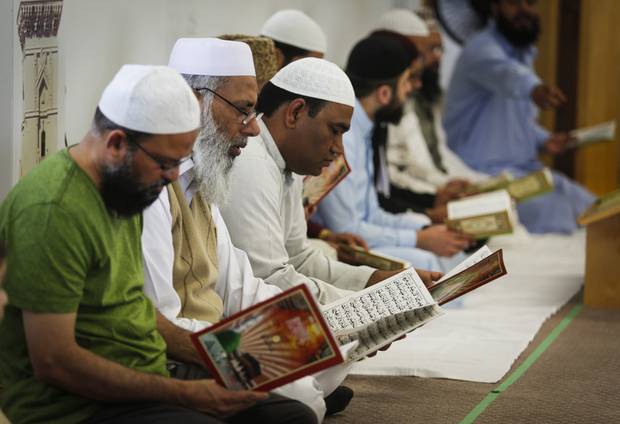
Calgary’s Muslim community remembered Ali as a great champion of their religion.
JEFF McINTOSH/THE CANADIAN PRESS
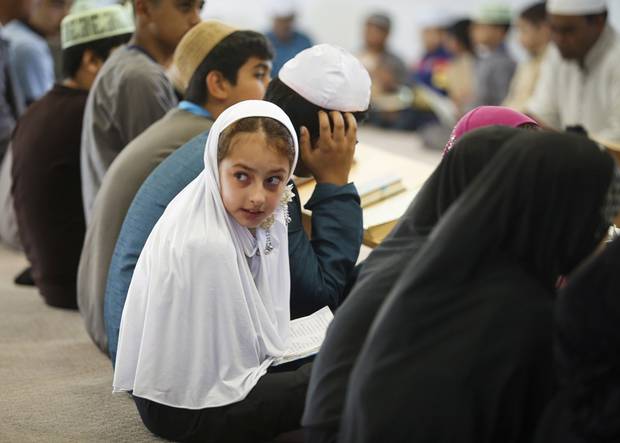
A young girl looks back as she attends the Calgary memorial.
JEFF McINTOSH/THE CANADIAN PRESS
He said the Calgary memorial was also a way to remind Muslim youth, who made up most of the gathering at the mosque, of how Ali inspired a generation.
Fifteen-year-old Hassaan Rizvi said Ali helped him refocus his faith and was a role model both as a boxer and a Muslim. "Muhammad Ali he became my inspiration because he says I want to preach my religion, I want to make my God happy. I want to know my religion better. That's what he did."
Rizvi, who is a volunteer at the mosque, said he was glad to have been able to participate in the ceremony. "This was very important for me because I was a very very big fan of Muhammad Ali," he said.
The message of Ali's importance was also passed on to some of the younger kids who attended. Asked what he knew of Ali, seven-year-old Hasan Noonari said "he was a person that was really good to our religion, and he was a really good boxer, and he died at the age of 74."
